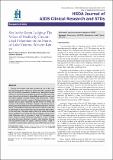| dc.contributor.author | Stephen O Ombere, Erick O Nyambedha, Salome A Bukac | |
| dc.date.accessioned | 2020-11-25T09:06:57Z | |
| dc.date.available | 2020-11-25T09:06:57Z | |
| dc.date.issued | 2018-03-22 | |
| dc.identifier.uri | https://repository.maseno.ac.ke/handle/123456789/3006 | |
| dc.description.abstract | Fishing communities have been reported as one of the highest-risk groups for HIV infection in Kenya and other countries with high HIV and AIDS prevalence. Studies along Lake Victoria region, where HIV and AIDS had a devastating impact, provides insight into many factors that contribute to vulnerability among fishing communities. Kenya adopted Voluntary Medical Male Circumcision (VMMC) as additional HIV prevention measure. Existing evidence shows that despite Nyanza region registering highest number of VMMC, the number of HIV infections is still high. However, a few studies are explaining sexual risk behaviours of circumcised fishermen in Western Kenya. This qualitative study explored the socio-cultural context and its relationship to circumcised men’s sexual behaviour after VMMC. In this study, sex in the green lodging (sex in the bushes at the lake shore) emerged as an actual risky sexual behaviour since circumcised fishermen used no condoms or other HIV preventive measures. Moreover, sexual intercourse occurred in a hurry. Findings also show that when fishermen migrate to other beaches, they get new sex partners whose HIV status is unknown to them. These results help in explaining the continuous rising of HIV infection among the fisherfolk population despite the adoption of VMMC. | en_US |
| dc.publisher | HSOA Journal of AIDS Clinical Research and STDs | en_US |
| dc.subject | Circumcision; HIV/AIDS; Reproductive health; Sexual behaviour | en_US |
| dc.title | Sex in the Green Lodging: The Voices of Medically Circum-cised Fishermen on the Shores of Lake Victoria, Western Ken-ya | en_US |
| dc.type | Article | en_US |

